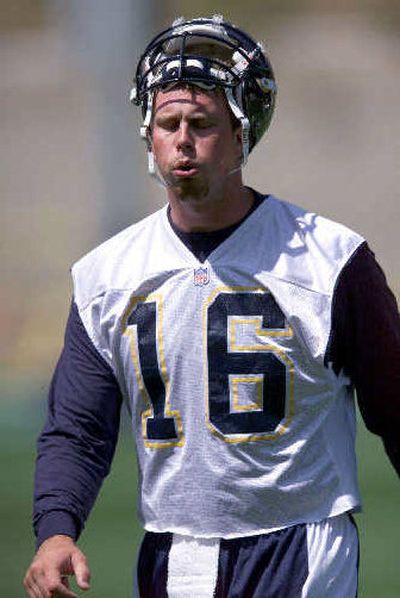One of draft’s biggest busts, Leaf matures into coaching role

West Texas A&M University is home to the 2005 Lone Star Conference football champions. It also is home to fresh starts and no frills. Ryan Leaf answered his own phone.
“Coach Leaf,” he said.
Leaf last week finished his first spring practice as the NCAA Division II Buffaloes’ quarterbacks coach. He’s a long way from 2002, when he walked away from the NFL as what some consider one of the biggest busts in league history.
“I wish I’d have played better and handled myself in a better way, but there’s nothing I can do about it now,” said Leaf, 29. “Not ready. Not there. I’m not going to let a five-year snippet of my life define what the next 40 or 50 years are going to be.”
It has been eight years since the Indianapolis Colts took quarterback Peyton Manning over Leaf with the No. 1 pick in the 1998 NFL draft. That left it to San Diego to trade two first-round selections and two players to move up one spot to get Washington State University’s Leaf, whom the Chargers waived after three contentious, controversy-marred, injury-plagued seasons.
Manning is on his way to the Pro Football Hall of Fame. Leaf is in Canyon, Texas, amidst the Panhandle oil fields south of Amarillo. Every year as the NFL gathers to choose from the latest crop of college stars, as it will this weekend, Leaf’s name resurfaces among the cautionary tales of how difficult – some would say catastrophic – projecting talent can be.
Yet Leaf is happy, as is West Texas A&M coach Don Carthel.
“He’s been unbelievable,” said Carthel, who hired Leaf in February. “He’s been fabulous with our quarterbacks and with the staff and in the community. He’s done a lot of volunteer charity stuff.”
Those activities include working at the Mavericks Boys Club, lending a hand with United Way and reading to elementary school students.
The former Cougars All-American quarterback is calling a new set of signals.
Carthel was both intrigued and wary when former WSU coach Mike Price, now at Texas-El Paso, called and recommended Leaf. The Buffaloes were coming off a 10-2 run in Carthel’s first season, and he didn’t want to mess up a good thing. He had heard the Leaf stories: scrapes with fans and the media and Chargers general manager Bobby Beathard. Arrogant. Selfish. Out of shape. Bad work habits.
“Boy Blunder,” fans called him.
Carthel brought Leaf in for four days. He plunged Leaf into the Buffaloes’ routine. Carthel and his staff watched closely. They saw nothing of the guy they had heard about. The job was offered and accepted.
Leaf went 4-17 as a starter with 14 touchdowns and 36 interceptions in his five NFL seasons: three with San Diego, a training camp with Tampa Bay and a year in Dallas. He signed with Seattle in 2002 but retired just before training camp opened.
Leaf admits he was a combustible mix of immaturity and outsized expectations as an NFL player. He left WSU a year early. He was 20 when he was drafted, and unprepared.
When he retired in 2002, he was frustrated and bitter. He went back to school and in 2005 earned his degree in arts and humanities. He hung out on his Montana ranch. He traveled. He watched his brother Brady play quarterback for Oregon. And he missed football more and more.
You don’t seek a Division II coaching job unless you love the game. The pay is meager and the hours are long. Leaf spends his days monitoring study hall, tutoring, supervising conditioning workouts, standing behind the quarterback during practice, making the same reads and checks.
“It’s not glamorous,” Leaf said. “You’ve got to be in the weight room. You’ve got to be a ball boy out on the practice field. All that is fine. I don’t need any more attention than anybody else. The interest level in me kind of boggles my mind.”
Leaf pocketed $11.25 million in bonuses from the Chargers and he has invested well.
This isn’t about money.
He never liked pro football, he said. He loved college football, loves it still, and doesn’t plan to leave it again.